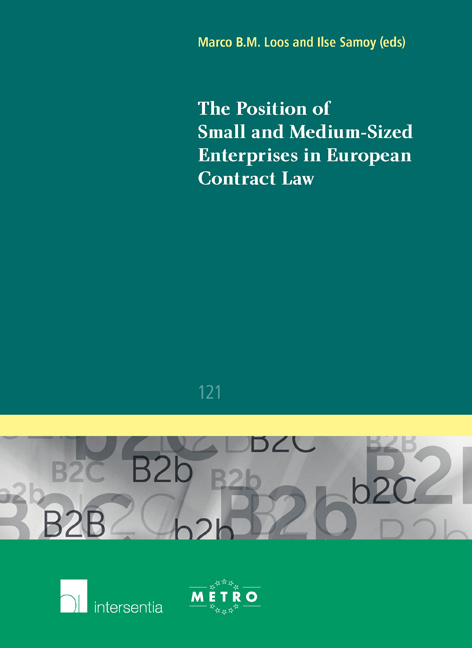Book contents
- Frontmatter
- Contents
- The Position of Small and Medium-Sized Enterprises in European Contract Law: An Introduction
- Chapter 1 SMEs in the Common European Sales Law
- Chapter 2 Can the Common European Sales Law do without the definition of an SME?
- Chapter 3 A Consumer Law for Professionals: Radical Innovation or Consolidation of National Practices?
- Chapter 4 The CESL and its Unfair Terms Protection for SMEs
- Chapter 5 Unfair Terms in Contracts Between Businesses A Comparative Overview in Light of the Common European Sales Law
- Chapter 6 Harmonisation of Rules on Business-to-Business Marketing Practices: A Critical Analysis of the MCAD Report
- Ius Commune Europaeum
Chapter 1 - SMEs in the Common European Sales Law
Published online by Cambridge University Press: 27 November 2017
- Frontmatter
- Contents
- The Position of Small and Medium-Sized Enterprises in European Contract Law: An Introduction
- Chapter 1 SMEs in the Common European Sales Law
- Chapter 2 Can the Common European Sales Law do without the definition of an SME?
- Chapter 3 A Consumer Law for Professionals: Radical Innovation or Consolidation of National Practices?
- Chapter 4 The CESL and its Unfair Terms Protection for SMEs
- Chapter 5 Unfair Terms in Contracts Between Businesses A Comparative Overview in Light of the Common European Sales Law
- Chapter 6 Harmonisation of Rules on Business-to-Business Marketing Practices: A Critical Analysis of the MCAD Report
- Ius Commune Europaeum
Summary
The importance of SMEs for the European Market
The concept of small and medium-sized enterprises (SMEs) has long been included in the European Union's lexicon. The importance of SMEs for the European Market is irrefutable. According to data from the EUROSTAT quoted by the European Economic and Social Committee, 99.8% of European businesses are SMEs, 92% of which are microenterprises with an average of two employees. The Committee points out that microenterprises export to a small number of Member States after analysing the market in depth, that the standard business model of a microenterprise does not aim to conclude cross-border contracts in 27 Member States, and that there are major barriers to cross-border transactions by SMEs.
SMEs and transaction costs
The Proposal for a Regulation of the European Parliament and of the Council on a Common European Sales Law (the Proposal) pays special attention to SMEs, namely in its Explanatory Memorandum, where it acknowledges that ‘the costs resulting from dealings with various national laws are burdensome particularly for SMEs. In their relations with larger companies, SMEs generally have to agree to apply the law of their business partner and bear the costs of finding out about the content of the foreign law applicable to the contract and of complying with it. In contracts between SMEs, the need to negotiate the applicable law is a significant obstacle to cross-border trade. For both types of contracts (business-to-business and business-to-consumer) for SMEs, these additional transaction costs may even be disproportionate to the value of the transaction’. According to the second recital of the Proposal, the deterrent effect of contract-law-related barriers ‘is particularly strong for small and medium-sized enterprises (SME) for which the costs of entering multiple foreign markets are often particularly high in relation to their turnover. As a consequence, traders miss out on cost savings they could achieve if it were possible to market goods and services on the basis of one uniform contract law for all their cross-border transactions and, in the online environment, one single web-site’. Finally, recital 7 states that ‘the barriers to cross-border trade may jeopardise competition between SME and larger companies. In view of the significant impact of the transaction costs in relation to turnover, an SME is much more likely to refrain from entering a foreign market than a larger competitor’.
- Type
- Chapter
- Information
- Publisher: IntersentiaPrint publication year: 2014



